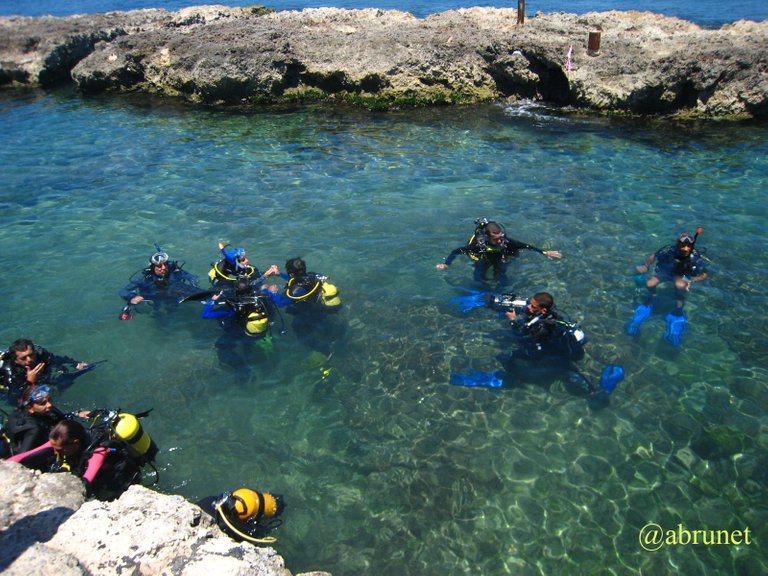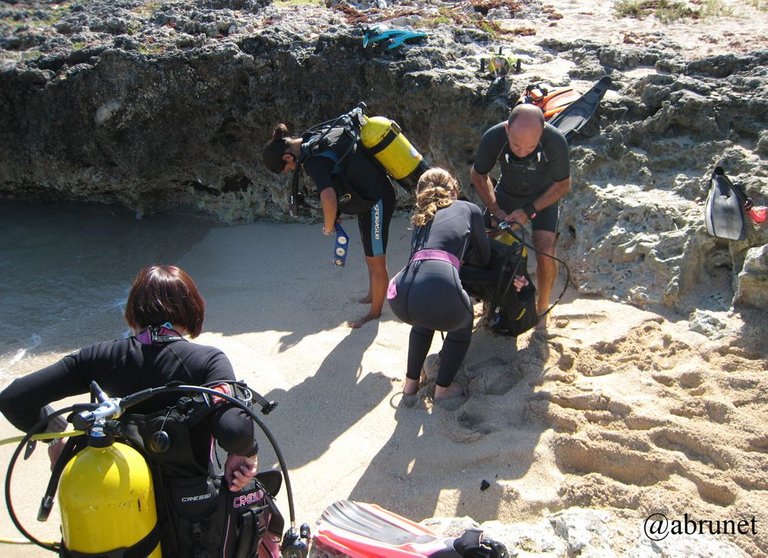
La actividad del Buceo cada año suma más adeptos y las personas se maravillan de conocer un medio que atesora una gran diversidad de especies, tanto de su flora como de su fauna.
El hombre ha evolucionado durante millones de años para que fisiológicamente su organismo funcione bajo las condiciones físicas de la atmósfera terrestre.
Una incursión en medio subacuático, independientemente de la profundidad a la que nos encontremos, trae como consecuencia, cambios en las condiciones físicas que rodean al buceador y, también ocurren cambios fisiológicos en todos los sistemas del organismo.
Los aspectos físicos siempre actuarán sobre la fisiología del ser humano, determinando particularidades en su actividad debajo del agua, siendo las principales:
Durante el buceo, se genera una presión por encima de la presión atmosférica, produciendo un estado de hiperbaria, que actúa sobre todos los órganos y sistemas del cuerpo humano.
A sólo 10 metros de profundidad nuestro cuerpo se someterá a 2 atmósferas de presión absoluta (2 ATA).Hay limitaciones en la velocidad del movimiento, porque el agua es un medio más denso que el aire.
- Hay un aumento del esfuerzo respiratorio e inversión de la dinámica respiratoria normal. En tierra la inspiración es activa y la espiración es pasiva. Dentro del agua al bucear ocurre lo contrario, las inspiraciones se hacen pasivas y las espiraciones activas y forzadas. Esto se produce porque aumenta el espacio muerto de las vías respiratorias por el equipamiento que usamos para bucear, lo que trae consigo un aumento de la resistencia al paso del aire. A su vez, durante un buceo con equipamiento autónomo, el regulador a demanda, nos suministra el aire con cierta presión positiva, lo que hace que las inspiraciones se realicen con más facilidad.

Hay un mayor gasto energético, ya que nos movernos en un medio 800 veces más denso que el aire.
Existe una estimulación intensa de los termorreceptores y barorreceptores del organismo, los cuales producen cambios fisiológicos.
- La temperatura es diferente a la de nuestro hábitat natural. Existe un aumento de la perdida de calor del cuerpo, por mecanismos de conducción, convección, irradiación y evaporación.
- Se producen cambios en nuestra visión, que ocurren por la desaparición gradual de los colores, según aumenta la profundidad; aparejados a las alteraciones que existen en las dimensiones y distancias a los objetos, los que suelen verse más cerca y más grandes de lo que son en realidad.
- Nuestra visibilidad está limitada, por los sedimentos en el agua y la refracción de los rayos luminosos.
La persona se encuentra sometida a una flotabilidad a la que no está acostumbrada. Percibimos un estado de semi-ingravidez que nos hace sentir relajados.
Existen cambios en la percepción de los sonidos. El agua es un medio 800 veces más denso que el aire, por lo que los sonidos se transmiten con mayor intensidad. La velocidad de propagación del sonido es de 1500 metros por segundo (m/s), en comparación con la del aire que es de 330 m/s. Debido a esto, nuestro sistema nervioso es incapaz de discernir a cual membrana timpánica llega primero la onda sonora. En la práctica vemos que debajo del agua, se pierde la capacidad de ecolocalización, siendo imposible determinar la dirección de una fuente sonora.
Bueno Hivers, como han podido leer, estos 10 aspectos son importantes, ya que el buceo es una actividad donde conocer los cambios a los que se somete nuestro cuerpo dentro de un medio subacuático , nos ayudará a movernos en el reino de Neptuno con mayor entendimiento, y podremos entender mejor, todo aquello que sentimos al disfrutar de una hermosa actividad de buceo.

Diving is becoming more and more popular every year and people are amazed to learn about an environment that treasures a great diversity of species, both flora and fauna.
Man has evolved over millions of years so that physiologically his organism functions under the physical conditions of the terrestrial atmosphere.
An incursion into the underwater environment, regardless of the depth at which we find ourselves, brings as a consequence, changes in the physical conditions surrounding the diver and physiological changes also occur in all systems of the body.
The physical aspects will always act on the physiology of the human being, determining particularities in its activity underwater, being the main ones:
During diving, a pressure above atmospheric pressure is generated, producing a state of hyperbaria, which acts on all organs and systems of the human body.
At a depth of only 10 meters our body will be subjected to 2 atmospheres of absolute pressure (2 ATA).There are limitations in the speed of movement, because water is a denser medium than air.
There is an increase in respiratory effort and reversal of normal respiratory dynamics. On land, inspiration is active and expiration is passive. In the water, when diving, the opposite occurs, inhalations become passive and exhalations become active and forced. This occurs because the dead space in the airways is increased by the equipment we use for diving, which brings with it an increase in resistance to the passage of air. In turn, during a dive with autonomous equipment, the on-demand regulator supplies us with air with a certain positive pressure, which makes the inspirations easier.

There is a greater energy expenditure, since we move in a medium 800 times denser than air.
There is an intense stimulation of the body's thermoreceptors and baroreceptors, which produce physiological changes.
- The temperature is different from that of our natural habitat. There is an increase in heat loss from the body, by conduction, convection, irradiation and evaporation mechanisms.
- There are changes in our vision, which occur due to the gradual disappearance of colors, as depth increases; coupled with the alterations that exist in the dimensions and distances to objects, which are usually seen closer and larger than they really are.
- Our visibility is limited by the sediments in the water and the refraction of light rays.
The person is subjected to a buoyancy to which he is not accustomed. We perceive a state of semi-ingravity that makes us feel relaxed.
There are changes in the perception of sounds. Water is a medium 800 times denser than air, so sounds are transmitted with greater intensity. The propagation speed of sound is 1500 meters per second (m/s), compared to that of air which is 330 m/s. Because of this, our nervous system is unable to discern which tympanic membrane the sound wave reaches first. In practice we see that underwater, the ability to echolocate is lost, making it impossible to determine the direction of a sound source.
Well Hivers, as you have been able to read, these 10 aspects are important, since diving is an activity where knowing the changes that our body undergoes in an underwater environment, will help us to move in the realm of Neptune with greater understanding, and we can better understand everything we feel when enjoying a beautiful diving activity.

Fotos por/Photos by Andrés Brunet
@abrunet
Gracias por leer/Thank you for reading
Bienvenidos sus comentarios/Welcome your comments
¡Saludos in finitos!/Infinite greetings!
Dr. Andrés Antonio Brunet Mikuskiewicz
MSc.Medicina Hiperbárica y Subacuática
Master's Degree in Hyperbaric and Underwater Medicine
E.mail: [email protected]
Ver/See: Linkedin
Congratulations @abrunet! You have completed the following achievement on the Hive blockchain and have been rewarded with new badge(s):
Your next target is to reach 1750 upvotes.
You can view your badges on your board and compare yourself to others in the Ranking
If you no longer want to receive notifications, reply to this comment with the word
STOPCheck out the last post from @hivebuzz:
Support the HiveBuzz project. Vote for our proposal!
¡Felicitaciones!
Estás participando para optar a la mención especial que se efectuará el domingo 22 de mayo del 2022 a las 8:00 pm (hora de Venezuela), gracias a la cual el autor del artículo seleccionado recibirá la cantidad de 1 HIVE transferida a su cuenta.
¡También has recibido 1 ENTROKEN! El token del PROYECTO ENTROPÍA impulsado por la plataforma Steem-Engine.
1. Invierte en el PROYECTO ENTROPÍA y recibe ganancias semanalmente. Entra aquí para más información.
2. Contáctanos en Discord: https://discord.gg/hkCjFeb
3. Suscríbete a nuestra COMUNIDAD y apoya al trail de @Entropia y así podrás ganar recompensas de curación de forma automática. Entra aquí para más información sobre nuestro trail.
4. Visita nuestro canal de Youtube.
Atentamente
El equipo de curación del PROYECTO ENTROPÍA